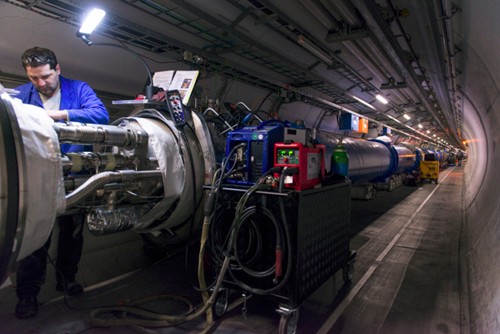
credit: CERN
The Return of CERN
by Terence Thomas
On December 18th of 2012, it was announced that the large Hadron Collider would be shut down for
maintenance and upgrading. The primary goal was to make adjustments, add new components and systems,
and take advantage of the new techniques that have taken place in the field of solid state design in
just the last few years. New materials and refinements in manufacturing have led to faster and more
stable components. New combinations of super-conductor materials and the development of hyper-drive
devices have made the future of the collider and indeed the future of quantum physics, remarkable
reality.
Perceptions
To theorize on a field that is so difficult to demonstrate practical applications has made quantum
physics seem more of a source of science fiction than a serious subject for study. Our fascination
with the word quantum has, for some time now, given license to such products as quantum watches,
quantum stereos and even quantum burgers. Fortunately, commercial trends are short lived, the use
of the word quantum has taken a downturn and the commercial world has moved on to the next fad.
The Hadron Collider has made such contributions that we no longer look at quantum physics as a place
where scientists sit around making up the craziest ideas they can think of. It is time to take the
accomplishments of the Hadron Collider seriously and realize that we are on the verge of a practical
applied science. Our limitations have been reduced and the improvements in technology have given us
the opportunity to even further the research capability of many other fields of science.
Timing
Our perceptions are really rather slow and what we see is actually old light. This accounts for car
accidents or injuries due to perceiving events too late to respond properly. Faster compilation of
information and storage of these events like atomic activities, can be enhanced by faster operating
semi-conductors. They have made it possible for computers to enter the terabyte age and in no other
field of science, is timing more important. In fact, the term quantum computer has become a new
catch phrase. Forces that are involved in the actions of subatomic particles are still beyond our
ability to monitor because the activities we attempting to watch are faster than the operating speed
of the equipment we use. The faster we can register the information though, the more we can define
threshold elements. This new view will make future projects more efficient and expand our knowledge
in new ways we have not yet discovered.
Graphics
The improved timing in computer speed can lead to more accurate speculation about what we might see
if our visual perceptions were expanded. Because of developments in graphics, illustrations of
sub-atomic activities will become a new tool in the understanding of the operation of all quantum
elements. The two year shut down has also given the scientists time to evaluate what they have
learned so far. Both particle information and equipment design will benefit from the offline time as
the performance of the Hadron Collider will be considerably enhanced and practical application of
quantum principals will become more of a reality.
